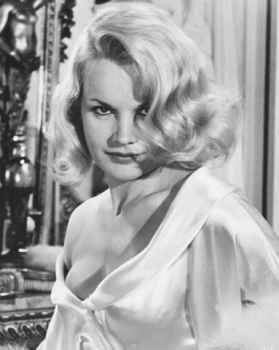Carroll Baker
Carroll Baker (born ✦May 28, 1931) is a former American film, stage, and television actress. Throughout the 1950s and 1960s, Baker's range of roles from naive ingenues to brash and flamboyant women established her as both a serious dramatic actress and a blonde bombshell. While performing on Broadway in 1954, she was recruited by director Elia Kazan to play the lead in Tennessee Williams's Baby Doll (1956). Her role in the film as a sexually repressed Southern bride lent Baker overnight notoriety and earned her BAFTA and Academy Award nominations for Best Actress, as well as a Golden Globe award for Most Promising Newcomer that year.
Other notable early roles included Giant (1956) and But Not for Me (1959), as well as westerns such as The Big Country (1958), How the West Was Won (1962), and Cheyenne Autumn (1964). In the mid-1960s, Baker became an established sex symbol for her roles in The Carpetbaggers (1964), Sylvia (1965), and Harlow (1965). She relocated to Italy in 1966 amidst a legal battle over her contract with Paramount Pictures and spent the following ten years starring in hard-edged horror and Giallo thrillers, including Umberto Lenzi's Paranoia (1969) and Knife of Ice (1972), before re-emerging for American audiences as a character actress in Andy Warhol's cult film Bad (1977).
Baker worked prominently in television throughout the 1980s and 1990s, appearing on the series Murder, She Wrote; L.A. Law, and Roswell, and had supporting roles in the films Ironweed (1987), Kindergarten Cop (1990), and The Game (1997). She formally retired from acting in 2002. In addition to acting, Baker is also the author of three books.
Baker and the USO
After leaving Hollywood in the mid-1960s, Baker traveled with Bob Hope's Christmas USO troupe entertaining soldiers in Vietnam and Southeast Asia, an experience which she described as reformative: "In the hospitals, I held the hands of damaged young men, and I realized that my pain was not exclusive: that in this world there was suffering much more terrible than mine.
Chat rooms • What links here • Copyright info • Contact information • Category:Root
